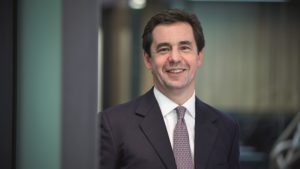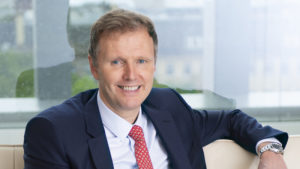Perhaps more than any other time in modern history, financial markets find themselves buffeted by global economic and geopolitical challenges. In the age of social media, an impulsive tweet can send markets tumbling. While fund managers may still prefer to focus on the minutiae of individual securities and dismiss some of this as ‘noise’, there are certain secular and cyclical trends that cannot be ignored.
Although today’s particular conditions are unprecedented, they may not be as bad as the bankruptcy of Lehman Brothers and the near-collapse of the global economic system a decade ago. In fact, a changing environment often present opportunities that need to be carefully considered as part of portfolio construction.
National self-preservation
The recent trade tensions between the US and China, for example, are part of a broader trend of stronger national self-preservation – almost deglobalisation. After a prolonged era in which barriers between countries came down, where companies had access to new markets and cross-border deals were commonplace, governments are increasingly introducing protectionist measures. Donald Trump’s ‘Making America Great Again’ approach is perhaps the most obvious manifestation of this.
This will inevitably have an impact on specific companies and sectors. Companies may see their range of potential markets narrow, their ability to transact across borders limited at greater cost and their access to global talent shrink.
The actions of politicians are now more likely to be a headwind to corporate growth where once they supported it. In any changing environment, there will also be winners – such as those companies that facilitate local distribution – but the deglobalisation trend needs to be a factor in investment thinking.
Disruption and opportunity
Within all of this, the disruption and opportunity of the developments in technology continues. Much is written about how technology is displacing jobs. Where initially it affected only blue-collar jobs through the automation of construction processes, the advent of automated call centres, AI and algorithmic processing and so forth now also increasingly impacts white-collar jobs.
Academics suggest that as many as half of the jobs we do today will disappear over the next decade. As opposed to improving life for all, this may create still more polarised societies, with growing income and wealth disparity.
Certainly, there is considerable political dislocation and social discord. In the UK and elsewhere, democracy as we know it is being tested to the limit. There has been an unprecedented challenge on centuries-old institutions but, at the same time, we see political and economic issues being influenced by unelected bodies – most notably, the central banks.
Negative yields
Their intervention over the past decade has been vast and has massively changed the landscape for investment. Across the world, central banks have cut interest rates to levels never seen before. Yields have fallen to the extent that one-third of bonds now trade with a negative yield and some countries – for example, Germany and Switzerland – have no bonds with a positive yield.
Initially welcomed by investors, today there are concerns over the impact of ongoing central bank QE policies on global economies and the banking sector. There is also a question over whether this is potentially sustaining companies and economies artificially – allowing them merely to limp on because they can secure cheap debt.
Although this may sound daunting, there will clearly be winners and losers from this reshaping of the global economic and potentially political order – and therefore opportunity. As investors, it is important to recognise these shifting parameters, identify the risks and opportunities and ensure we build resilience into our portfolios.
During times of heightened uncertainty, as is currently the case, we need to recognise that for many investors the journey is as important as their end-goals. As such, when they experience unexpected high volatility in their investment portfolios, they may be more likely to sell out at the wrong time.
Minimise investor ‘anxiety’
It is important to minimise this investor ‘anxiety’ in order to keep people invested. This requires more effective communication during the investment journey to enable investors to take better decisions. Additionally, a better ‘matching’ of clients is necessary with not only an investment outcome in time, but also the likely journey to the outcome.
The current environment requires a focused investment process and discipline. Professional investors must test their approach, ensuring it is resilient and remains relevant as the corporate, global economic and political landscape changes. Economic power is shifting towards ‘new economy’ companies – towards companies with intangible rather than tangible assets. How do traditional metrics such as ‘price to book’ fit for this type of company? There is a need for investment metrics to adapt.
At the same time, the investment universe is broadening. The environment may be more complex, but the tools we have at our disposal to manage risks and access opportunities are broader.
Forward-looking portfolios
More than ever before, investment portfolios must be forward-looking. Benchmarks have their place and will always be part of the process, but they are essentially backward-looking. Resilient investment portfolios need exposure to these emerging trends, for which there often are very little historical benchmarking available.
There is often a tendency to under or overestimate the strength and endurance of these emerging trends or big geopolitical shifts, and their impact on incumbent businesses. The challenge is to differentiate between an investment fad and sustainable long-term investment opportunities.
In our politically and economically ‘fractured’ world, sustainability also has a very real meaning in the context of climate change, and the focus urged by movements such as Extinction Rebellion – hence, the necessary and growing importance of environmental, social and governance criteria (ESG) in investment portfolios.
Stewards of client capital
There are clear long-term advantages in prioritising companies that are committed to these aspects – as responsible stewards of our clients’ capital, we need to be responsive to these trends. The argument for incorporating ESG criteria goes beyond just risk and reputation management.
There is sound academic research to show that companies managed to these ESG principles are more sustainable and will perform better over time. It will therefore add to long-term resilience in portfolios by directing investments in a portfolio towards these companies, which also tend to be well-managed.
This is an unusual and often uncomfortable time to be an investor. There is a lot of noise, but at the same time substantial changes in the global economic and political landscape. As investors, we must be alert to the pitfalls, but also receptive to the opportunities.
Ferdi van Heerden is chief executive officer at Momentum Global Investment Management







